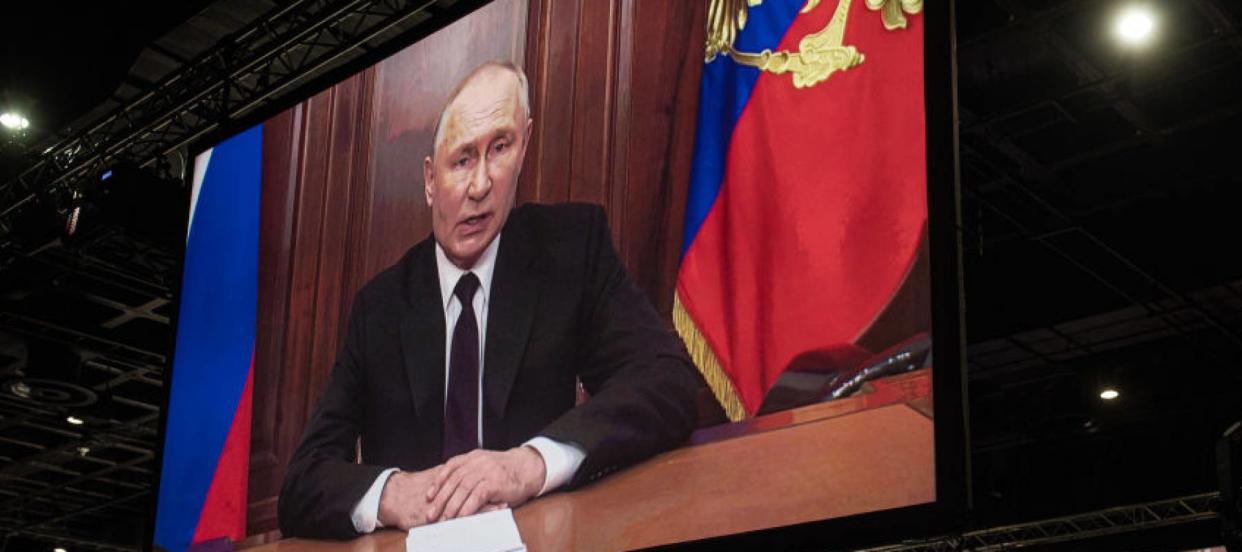'Gaining momentum’: Vladimir Putin says US de-dollarization is 'irreversible' in remote BRICS summit address — here’s what it could mean for the future of the greenback

The U.S. dollar has reigned supreme over the global economy for close to a century, but efforts to dethrone it are “gaining momentum,” says Russian president Vladimir Putin.
Putin called the dollar’s drop in dominance “objective and irreversible,” in an address at the 15th BRICS Summit in Johannesburg via video link on Tuesday.
Don't miss
Rich young Americans have lost confidence in the stock market — and are betting on these 3 assets instead. Get in now for strong long-term tailwinds
Worried about the economy? Here are the best shock-proof assets for your portfolio. (They’re all outside of the stock market.)
Jeff Bezos and Oprah Winfrey invest in this asset to keep their wealth safe — you may want to do the same in 2023
He also said the five BRICS members — Russia, China, India, Brazil and South Africa — which are home to more than 40% of the world’s population, are growing into global economic superpowers that could rival (and maybe even overtake) the G-7.
According to the World Bank, BRICS members’ share of global GDP grew from 18% in 2010 to 26% in 2021, with increases in all years during that period. China is leading the way, with over 70% of BRICS GDP in 2021.
But will it be enough to displace the greenback? Here’s more on how these emerging economies are seeking to reduce their reliance on the dollar — and how American officials are feeling about it.
BRICS growth
Putin claims that over the past decade, mutual investments and transactions between BRICS countries have increased sixfold — thanks partly to BRICS members’ mutual respect for each other’s interests.
The United Nations BRICS Investment Report 2023 states that BRICS economies represent 18% of global exports, with their share continuing to increase, while the growth rate of intra-BRICS exports also exceeds the global average.
When addressing bloc leaders in South Africa, Putin asked for continued collaboration between BRICS members: “During this summit, we shall discuss in detail the entire range of issues related to the transition to national currencies in all areas of economic co-operation between our five nations.”
The Russian president also took the opportunity to slam what he believes are “illegitimate sanctions” — laid down by the U.S. and other Western economic powers in response to Russia’s invasion of Ukraine — and the “unlawful freezing of sovereign states’ assets,” which he said “seriously weigh on the international economic situation.”
Read more: How can I stop the pain and make money in this nightmarish market? Here's 1 simple way you can protect your nest egg
Trades in local currencies
In an effort to reduce transaction costs, limit their exposure to global volatility and geopolitical risks, and boost their local economies, members of BRICS and their allies have begun settling trades in their local currencies instead of the U.S. dollar.
Just last week, India announced that its leading petroleum refiner, Indian Oil Corp., used the local rupee to buy one million barrels of oil from the Abu Dhabi National Oil Company — as part of a bilateral trading agreement between the two countries.
Despite more of these no-dollar transactions taking place with the assistance of the BRICS New Development Bank, U.S. Treasury Secretary Janet Yellen still believes that no currency currently exists that could displace the greenback.
The dollar’s dominance in global trade and capital flows dates back at least 80 years — not just because the U.S. is the world’s largest economy, but also because oil and other essential commodities are priced in the greenback.
“We should expect over time a gradually increased share of other assets in reserve holdings of countries — a natural desire to diversify,” said Yellen. “But the dollar is far and away the dominant reserve asset.”
What to read next
This janitor in Vermont built an $8M fortune without anyone around him knowing. Here are the 2 simple techniques that made Ronald Read rich — and can do the same for you
The US dollar has lost 98% of its purchasing power since 1971 — invest in this stable asset before you lose your retirement fund
Commercial real estate has outperformed the S&P 500 over 25 years. Here's how to diversify your portfolio without the headache of being a landlord
This article provides information only and should not be construed as advice. It is provided without warranty of any kind.
